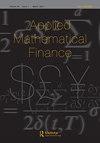Optimal Decisions in a Time Priority Queue
Q3 Mathematics
引用次数: 9
Abstract
ABSTRACT We show how the position of a limit order (LO) in the queue influences the decision of whether to cancel the order or let it rest. Using ultra-high-frequency data from the Nasdaq exchange, we perform empirical analysis on various LO book events and propose novel ways for modelling some of these events, including cancellation of LOs in various positions and size of market orders. Based on our empirical findings, we develop a queuing model that captures stylized facts on the data. This model includes a distinct feature which allows for a potentially random effect due to the agent’s impulse control. We apply the queuing model in an algorithmic trading setting by considering an agent maximizing her expected utility through placing and cancelling of LOs. The agent’s optimal strategy is presented after calibrating the model to real data. A simulation study shows that for the same level of standard deviation of terminal wealth, the optimal strategy has a 2.5% higher mean compared to a strategy which ignores the effect of position, or an 8.8% lower standard deviation for the same level of mean. This extra gain stems from posting an LO during adverse conditions and obtaining a good queue position before conditions become favourable.时间优先队列中的最优决策
摘要本文展示了限价订单在队列中的位置如何影响取消订单或搁置订单的决策。利用来自纳斯达克交易所的超高频数据,我们对各种账面损失事件进行了实证分析,并提出了对其中一些事件建模的新方法,包括各种头寸的账面损失取消和市场订单的规模。基于我们的经验发现,我们开发了一个排队模型,可以捕获数据上的程式化事实。这个模型包含一个独特的特征,它允许一个潜在的随机效应,由于代理的脉冲控制。我们将排队模型应用于算法交易环境中,考虑代理通过放置和取消LOs来最大化其期望效用。将模型与实际数据进行校正后,给出了智能体的最优策略。仿真研究表明,在相同的终端财富标准差水平下,最优策略的均值比不考虑头寸影响的策略高2.5%,在相同的均值水平下,最优策略的标准差比不考虑头寸影响的策略低8.8%。这种额外的增益源于在不利条件下张贴LO和在条件变得有利之前获得良好的队列位置。
本文章由计算机程序翻译,如有差异,请以英文原文为准。
求助全文
约1分钟内获得全文
求助全文
来源期刊

Applied Mathematical Finance
Economics, Econometrics and Finance-Finance
CiteScore
2.30
自引率
0.00%
发文量
6
期刊介绍:
The journal encourages the confident use of applied mathematics and mathematical modelling in finance. The journal publishes papers on the following: •modelling of financial and economic primitives (interest rates, asset prices etc); •modelling market behaviour; •modelling market imperfections; •pricing of financial derivative securities; •hedging strategies; •numerical methods; •financial engineering.
 求助内容:
求助内容: 应助结果提醒方式:
应助结果提醒方式:


